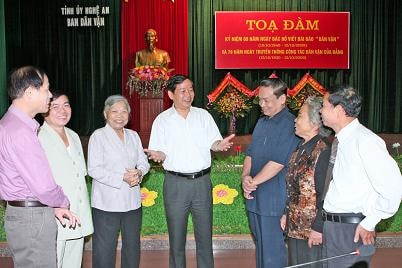Say big things in small words
From the first article "Mind""Colonialism" written in 1919, signed Nguyen Ai Quoc to Mrs.In the last newspaper "Improving the responsibility of caring for and educating children and adolescents", signed TL and published on June 1, 1969, Journalist Ho Chi Minh wrote for over 50 years with about 2,000 articles.
According to Uncle Ho, the theme throughout his journalism career was "fighting against colonialism, imperialism, feudalism, landlords, propagating national independence and socialism". The article "Mass Mobilization" published in the Truth Newspaper on October 15, 1949 under the pen name XYZ, Uncle Ho wrote about the hottest period of the resistance war against France in the major theme of "propaganda for national independence and socialism", the specific content was the work of mobilizing the masses to participate in revolutionary movements of party organizations, government levels and people's organizations. This is a classic work, a handbook for cadres and party members in mass mobilization work.
 |
Comrade Tran Van Hang, member of the Party Central Committee, Secretary of the Provincial Party Committee, had a friendly talk with leaders of the Provincial Party Committee's Mass Mobilization Commission through the periods. Photo: Sy Minh |
Indeed, the article "Mass Mobilization" has only 612 words but has mentioned and answered very basic and urgent issues of mass mobilization work. Readers, regardless of their level, even those who cannot read or write, can understand and follow. Uncle Ho wrote in a way that asks questions and answers concisely and easily, to clarify 4 specific contents in turn: 1. The basic premise of mass mobilization work; 2. What is mass mobilization? 3. Who is in charge of mass mobilization? 4. How should mass mobilization be? And Uncle Ho ended with a profound truth: "If mass mobilization is poor, everything will be poor. If mass mobilization is skillful, everything will be successful!".
The article "Mass Mobilization" opens with a very specific reason: "The issue of mass mobilization has been talked about a lot, discussed thoroughly, but because many localities and many cadres do not understand it thoroughly, they do not do it correctly." Next are the contents with the way of asking questions: "What is mass mobilization?", "Who is in charge of mass mobilization?", then answering in turn, in which, the most important part is part 1 stating the premise and basis of mass mobilization work with the affirmation: "Our country is a democratic country" with the elements of a truly democratic country.
The article continues by raising the question "What is mass mobilization?" and answers: "Mass mobilization is to mobilize all the forces of each citizen, not leaving out a single person, contributing to the entire people's force, to carry out the tasks assigned by the Government and organizations."
The article presents a solution to the problem: four steps to be taken in mass mobilization work: "1. We must find every way to make every citizen clearly understand that: it is beneficial to them and their duty, they must enthusiastically do it; 2. Whatever we do, we must discuss it with the people, ask for their opinions and experiences, together with the people make a plan that is practical for the local situation, then mobilize and organize the entire population to implement it; 3. We must monitor, help, urge, and encourage the people; 4. When we finish, we must review the work with the people, draw lessons, criticize, and reward."
The article "Mass Mobilization" was written in a clear and simple style: People doing mass mobilization work must "think with their brains, see with their eyes, listen with their ears, walk with their feet, speak with their mouths, and work with their hands". There are: "poor in mass mobilization" and "skillful in mass mobilization". The word "skillful" is irreplaceable because the word "skillful" in folklore often goes with skillful hands, skillful in eating, skillful in speaking... People doing mass mobilization work are skillful in speaking and skillful in working... which is very close, intimate and reasonable in that context. Here, Uncle Ho did not use the opposite words: poor - good, or poor - good for the reason of simplicity, closeness to everyone and logically in accordance with the requirements that he mentioned above.
After neatly resolving all the issues, Uncle Ho concluded simply as the truth: "If the mass mobilization is poor, then...", "If the mass mobilization is skillful, then...". Here, it can be said that the author did not cite any works or authors at all. The lack of citation does not make the article less important and attractive, but on the contrary, the article becomes "classic" in the way it raises and solves the problem clearly and concisely, in the rich and practical content, in the simple and clear writing style, in the precise and flexible use of language, and in the overall logical structure with tight arguments.
Obviously, Ho Chi Minh's journalistic style is vividly expressed through his easy-to-understand way of thinking and expressing, penetrating people's hearts, evoking great ideas, promoting good things with simple, figurative words, "expressing big things with small words" is what journalists must learn and follow. The "big thing" of the article "Mass Mobilization" is the current significance throughout the past 60 years not only for those working in Mass Mobilization but also for the entire work of Party building, promoting the strength of the entire nation in building and defending the Fatherland. Uncle Ho's "small words" are 612 words that everyone understands and can follow to create "big things" for the country and the nation, creating the boundless strength of the Ho Chi Minh era!
Phu Chau






